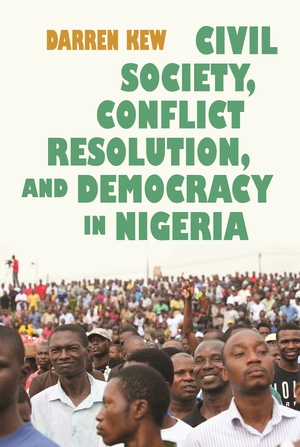"This great work will provoke practitioners and could help educate the next generation of democracy activists."—Political Science Quarterly
"Provides a number of important insights. These are to be found in the very interesting narratives of the activities and experiences of three generations of civil society organizations concerning democratic development in Nigeria. It provides insight into the nature of the diversity in civil society organizations; the complexity of interactions among civil society actors, their motivations, values, communications, and other challenges; and the conflict management mechanisms within those organizations."—Perspectives on Politics
"This is a well-written, carefully researched study of civil society, democratization and conflict in Africa’s most populous state. Kew covers a significant case and offers an original addition to our conception of democratic development."—Peter M. Lewis, associate professor and director of the African Studies Program, Johns Hopkins University
"This is a comprehensive, objective and highly readable in-depth analysis of three-generations of civil society organizations in Nigeria, tracing their evolution from pre-colonial times to modern day developments. Kew breaks new ground by showing how Tocqueville's maxim that ‘associations are classrooms of democracy’ holds, provided they are democratically structured internally."—Pauline H. Baker, President Emeritus, the Fund for Peace,
Description
African nations have watched the recent civic dramas of the Arab Spring and Occupy Wall Street asking if they too will see similar civil society actions in their own countries. Nigeria—Africa’s most populous nation—has long enjoyed one of the continent’s most vibrant civil society spheres, which has been instrumental in political change. Initially viewed as contributing to democracy’s development, however, civil society groups have come under increased scrutiny by scholars and policymakers. Do some civil society groups promote democracy more effectively than others? And if so, which ones, and why?
By examining the structure, organizational cultures, and methods of more than one hundred Nigerian civil society groups, Kew finds that the groups that best promote democratic development externally are themselves internally democratic. Specifically, the internally democratic civil society groups build more sustainable coalitions to resist authoritarian rule; support and influence political parties more effectively; articulate and promote public interests in a more negotiable fashion; and, most importantly, inculcate democratic norms in their members, which in turn has important democratizing impacts on national political cultures and institutions. Further, internally democratic groups are better able to resolve ethnic differences and ethnic-based tensions than their undemocratically structured peers.
This book is a deeply comprehensive account of Nigerian civil society groups in the late twentieth and early twenty-first centuries. Kew blends democratic theory with conflict resolution methodologies to argue that the manner in which groups—and states—manage internal conflicts provides an important gauge as to how democratic their political cultures are. The conclusions will allow donors and policymakers to make strategic decisions in their efforts to build a democratic society in Nigeria and other regions.
About the Author
Darren Kew is associate professor and chair of the department of conflict resolution, human security, and global governance, and executive director of the Center for Peace, Democracy, and Development at the University of Massachusetts, Boston.
May 2016

